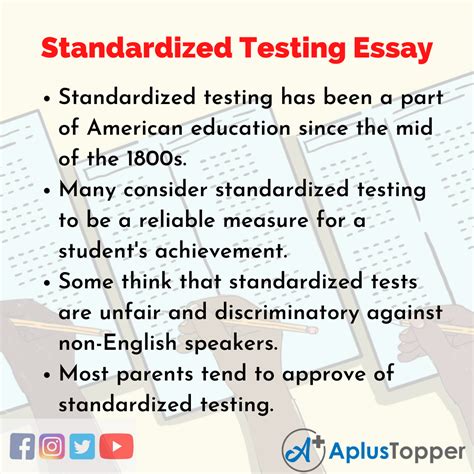What is a Standardized Test?
A standardized test refers to a pre-designed, objective, and often norm-referenced assessment administered and scored under uniform procedures to many individuals simultaneously or sequentially. The tests typically measure a wide range of abilities, knowledge, and skills. They aim to provide a consistent and fair assessment of all test-takers, allowing for comparisons among them.

Purpose of Standardized Tests
Standardized tests serve multiple purposes, including:
- Educational Assessment: Measuring students’ academic achievement and progress in specific subjects or skill areas.
- University and College Admissions: Evaluating students’ academic readiness and suitability for higher education.
- Employment Selection: Assessing candidates’ qualifications and abilities for various job roles.
- Credentialing and Certification: Determining individuals’ proficiency and expertise in specialized fields.
- Educational Research: Providing data for research on student learning, curriculum development, and educational policies.
Types of Standardized Tests
Numerous types of standardized tests exist, each designed for specific purposes:
- Achievement Tests: Measure students’ knowledge and skills acquired through classroom instruction, such as the SAT, ACT, and state standardized tests.
- Aptitude Tests: Assess individuals’ innate potential and general abilities, such as the GRE, GMAT, and LSAT.
- Diagnostic Tests: Provide detailed information about individuals’ strengths and weaknesses in specific areas, such as the Individualized Education Program (IEP) tests.
- Personality Tests: Measure individuals’ personality traits, interests, and values, such as the Myers-Briggs Type Indicator (MBTI) and the Strong Interest Inventory.
- Proficiency Tests: Assess individuals’ language proficiency and communication skills, such as the TOEFL, IELTS, and DELF.
Importance of Standardization
Standardization is essential for ensuring the fairness and validity of standardized tests:
- Uniformity: Ensures that all test-takers are administered the same test under the same conditions.
- Objectivity: Eliminates the influence of subjective factors, such as personal biases, in scoring and interpreting results.
- Comparability: Allows for meaningful comparisons between different test-takers and groups.
- Validity: Measures what it claims to measure accurately and reliably.
Controversies Surrounding Standardized Tests
Standardized tests have been subject to ongoing debate and criticism:
- Bias: Concerns have been raised regarding potential biases in test content and administration that may disadvantage certain groups.
- Narrow Focus: Critics argue that standardized tests focus primarily on cognitive abilities and may not adequately assess creativity, problem-solving, and other important life skills.
- High-Stakes Decisions: High importance is often placed on standardized test scores, which can lead to stress and anxiety among students and educators.
- Teacher Burnout: The emphasis on standardized testing can contribute to teacher burnout and reduce the joy of teaching.
Strategies for Success on Standardized Tests
To enhance performance on standardized tests, consider the following strategies:
- Preparation: Start preparing early by studying relevant materials and taking practice tests.
- Time Management: Manage time wisely during the test by pacing yourself and allocating time for each section.
- Question Analysis: Read instructions carefully and analyze questions thoroughly to understand their intent.
- Multiple-Choice Strategies: Use process of elimination, guess intelligently, and avoid changing answers unless you are certain.
- Essay Writing: Plan your essays, use clear language, and support your arguments with evidence.
FAQs about Standardized Tests
1. What are standardized tests used for?
Standardized tests are used for educational assessment, university admissions, employment selection, credentialing, and educational research.
2. Are standardized tests biased?
Concerns have been raised about potential biases in test content and administration, but efforts are ongoing to address this issue.
3. Do standardized tests accurately measure all skills?
Standardized tests focus primarily on cognitive abilities and may not adequately assess a complete range of skills, such as creativity and problem-solving.
4. How can I prepare for standardized tests?
Preparation includes studying relevant materials, taking practice tests, and using effective test-taking strategies.
5. How important are standardized test scores?
Standardized test scores play an important role in educational and career opportunities, but they should not be the sole determinant of success.
6. What are some strategies for success on standardized tests?
Start preparing early, manage time wisely, analyze questions thoroughly, use multiple-choice strategies, and practice essay writing.
Future Applications of Standardized Tests
In addition to their current uses, standardized tests have the potential for further applications:
- Adaptive Assessments: Developing adaptive tests that adjust to the individual abilities of test-takers, providing more personalized and tailored assessments.
- Prediction and Analytics: Using test scores to predict future academic and career success and identify areas for improvement.
- Artificial Intelligence (AI)-Powered Scoring: Employing AI algorithms to score tests, ensuring greater accuracy and efficiency.
- Adaptive Testing for Language Learning: Personalized language tests based on the learner’s individual needs and progress.
Conclusion
Standardized tests are widely used assessments that provide valuable insights into individuals’ academic achievement, potential, and qualifications. While they have limitations and challenges, standardized tests remain an important tool for educational assessment and decision-making processes. By understanding their purpose, types, and strategies for success, individuals can effectively navigate standardized tests and leverage them for personal and professional growth.
